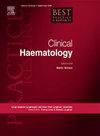靶向BCMA CAR-T治疗复发/难治性多发性骨髓瘤抗原阴性复发的研究进展
IF 2
4区 医学
Q3 HEMATOLOGY
引用次数: 0
摘要
靶向b细胞成熟抗原(BCMA)的嵌合抗原受体T细胞(CAR-T)治疗已成为治疗复发或难治性多发性骨髓瘤(RRMM)的一种新颖有效的治疗方式,取得了显著的治疗效果。然而,复发仍然是阻碍这种治疗长期疗效的主要问题,抗原阴性复发是一个特别具有挑战性的问题。BCMA抗原阴性复发的机制包括一系列现象,包括肿瘤抗原表达减少或丢失、BCMA脱落、抗原呈递受损、巨噬细胞增多、抗原突变和选择性剪接。为了克服BCMA CAR-T治疗中抗原阴性复发的问题,人们正在探索各种策略。这些包括双/多特异性CAR-T细胞治疗,与抗体-药物偶联物(adc)或双特异性t细胞接合物(BiTEs)的联合治疗,与造血干细胞移植(HSCT)的整合,新靶点的鉴定,以及创新细胞疗法如CAR-NK和CAR-M (car -巨噬细胞)的开发。此外,通过基因编辑技术优化CAR-T细胞以增强其耐久性和抗肿瘤活性是一个新兴的研究领域。未来,靶向BCMA CAR-T治疗将更加注重个体化和精准医疗,结合多种治疗方法降低复发率,从而提高治疗效果和延长治疗寿命。本文章由计算机程序翻译,如有差异,请以英文原文为准。
Research progress of targeted BCMA CAR-T therapy for relapsed/refractory multiple myeloma antigen-negative relapse
Chimeric antigen receptor T cell (CAR-T) therapy targeting B-cell maturation antigen (BCMA) has emerged as a novel and effective modality for the treatment of relapsed or refractory multiple myeloma (RRMM), achieving remarkable therapeutic outcomes. However, relapse remains a major problem impeding the long-term efficacy of this therapy, with antigen-negative relapse being a particularly challenging issue. The mechanisms underlying BCMA antigen-negative relapse encompass a spectrum of phenomena, including diminished or lost tumor antigen expression, BCMA shedding, impaired antigen presentation, trogocytosis, antigen mutations, and alternative splicing. To overcome the problem of antigen-negative relapse in BCMA CAR-T therapy, a variety of strategies are being explored. These include dual/multi-specific CAR-T cell therapy, combination therapies with antibody-drug conjugates (ADCs) or bispecific T-cell engagers (BiTEs), integration with hematopoietic stem cell transplantation (HSCT), identification of novel targets, and the development of innovative cell therapies such as CAR-NK and CAR-M (CAR-Macrophage). Additionally, the optimization of CAR-T cells through gene editing technologies to enhance their durability and anti-tumor activity is a burgeoning area of research. In future, targeted BCMA CAR-T therapy is poised to place greater emphasis on individualization and precision medicine, combining multiple therapeutic approaches to reduce the incidence of relapse, thereby improving treatment efficacy and longevity.
求助全文
通过发布文献求助,成功后即可免费获取论文全文。
去求助
来源期刊
CiteScore
4.20
自引率
0.00%
发文量
42
审稿时长
35 days
期刊介绍:
Best Practice & Research Clinical Haematology publishes review articles integrating the results from the latest original research articles into practical, evidence-based review articles. These articles seek to address the key clinical issues of diagnosis, treatment and patient management. Each issue follows a problem-orientated approach which focuses on the key questions to be addressed, clearly defining what is known and not known, covering the spectrum of clinical and laboratory haematological practice and research. Although most reviews are invited, the Editor welcomes suggestions from potential authors.

 求助内容:
求助内容: 应助结果提醒方式:
应助结果提醒方式:


